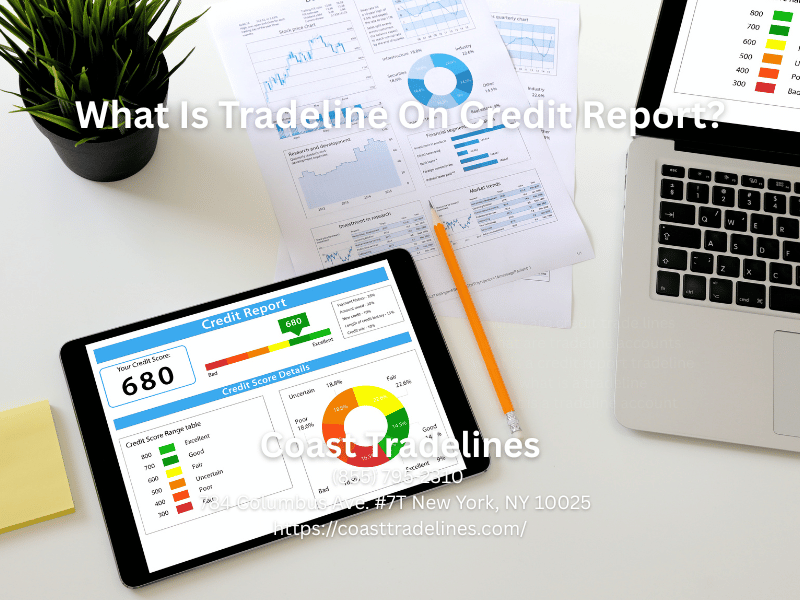When you check your credit report, you might come across a term that’s a bit unfamiliar: “tradeline.” So, what is a tradeline? Why is it vital for your credit score? A tradeline is a record of your credit accounts. It includes information about your credit cards, loans, and payment history. It plays a significant role in determining your creditworthiness. It influences everything from your FICO score to your ability to access loans from financial institutions.
If you’re new to credit or trying to improve your credit score, understanding tradelines is crucial. Your credit report comprises tradelines. Each tradeline can have a significant impact on your credit mix and credit utilization ratio. Whether you’re looking to repair your credit or build a stronger financial future, paying attention to your tradelines is key.
Remember, not all tradelines are the same. Some are revolving accounts, while others are installment loans. Knowing the difference can make all the difference for your credit score. Whether you’re an authorized user on a credit card or you have your own revolving accounts, understanding the ins and outs of tradelines can set you on the path to better credit management.
What is a Tradeline?
A tradeline is a credit account listed on your credit report. It includes details about the credit account, such as:
- the type of account,
- the credit limit,
- the balance,
- the payment history, and
- whether the account is in good standing.
The credit bureaus or credit reporting agencies collect this information from your credit card companies and other lenders.
Each tradeline represents a specific account you have with a credit card company or financial institution. It can include revolving accounts, such as credit cards. It can also include installment loans such as personal loans, auto loans, and mortgages. Financial institutions report each of these accounts to the credit bureaus. How you manage them can impact your credit score.
Your payment history is a significant factor that affects each tradeline. If you’re late on payments or have missed payments, that negative information will be in your credit file. Meanwhile, if you manage your tradelines well, it can improve your credit score. More so, it can open doors to better financial opportunities.
How Tradelines Affect Your Credit Score
Your credit score is a number that reflects your creditworthiness. Many factors influence it, with tradelines playing a pivotal role. The most popular credit scoring models, such as FICO and VantageScore, consider several factors when calculating your score. They think about your credit utilization ratio, payment history, and the types of credit accounts you have, or your credit mix.
The credit utilization ratio is the ratio of your credit card balances to your credit limits. This determines how much credit you’re using versus how much you have available. A high credit utilization ratio can show that you’re relying too much on credit. Meanwhile, keeping your balance low relative to your credit limit can boost your score.
Your credit mix also affects your credit score. A healthy credit mix includes both revolving accounts and installment loans. Having a diverse mix of tradelines can demonstrate to creditors that you can manage different types of credit.
Types of Tradelines
Tradelines fall into different categories based on the type of credit account they represent. The two main categories are revolving accounts and installment loans.
Revolving Accounts
These include credit cards and home equity lines of credit (HELOCs). With revolving credit, you have a set credit limit. Also, you can borrow and repay as needed, with the balance fluctuating over time. This flexibility can boost your credit score if you manage your balances right.
Installment Loans
These include loans like personal loans, auto loans, and mortgages. With installment loans, you borrow a set amount of money. You repay the loan in fixed monthly payments over a predetermined period. The key with installment loans is ensuring timely payments. This enables you to avoid late fees and negative marks on your credit file.
The Importance of Authorized User Tradelines
One strategy for improving your credit profile is becoming an authorized user on someone else’s credit card account. When you become an authorized user, the primary cardholder’s payment history and credit utilization will be on your credit file. This can help improve your credit score, especially if the primary cardholder has a good credit history.
Authorized user tradelines are a powerful tool for individuals with limited credit history or those looking to repair their credit score. But not all credit card companies report authorized user accounts to the credit bureaus. Before adding yourself as an authorized user, check whether the credit card company reports this information to the credit reporting companies.
Repairing Your Credit with Tradelines
If you’re struggling with a low credit score, one way to improve it is to add positive tradelines to your credit file. You can do it by paying off existing debts and keeping your credit card balances low. You can also consider buying authorized user tradelines from a reputable company.
Companies like Coast Tradelines offer solutions for those looking to improve their credit scores. We can add high-quality tradelines to your credit file. By choosing tradelines with strong payment histories and low credit utilization, you can see a boost in your credit score in a short time.
Why You Should Consider Coast Tradelines
If you’re looking to improve your credit score, adding tradelines from Coast Tradelines is a smart move. With a wide selection of tradelines, Coast Tradelines helps you find the right options to enhance your credit report. Whether you’re interested in adding an authorized user tradeline or purchasing a well-managed credit card tradeline, we provide reliable services that can help improve your credit profile. So, if you’re ready to improve your credit profile, check out Coast Tradelines today.


